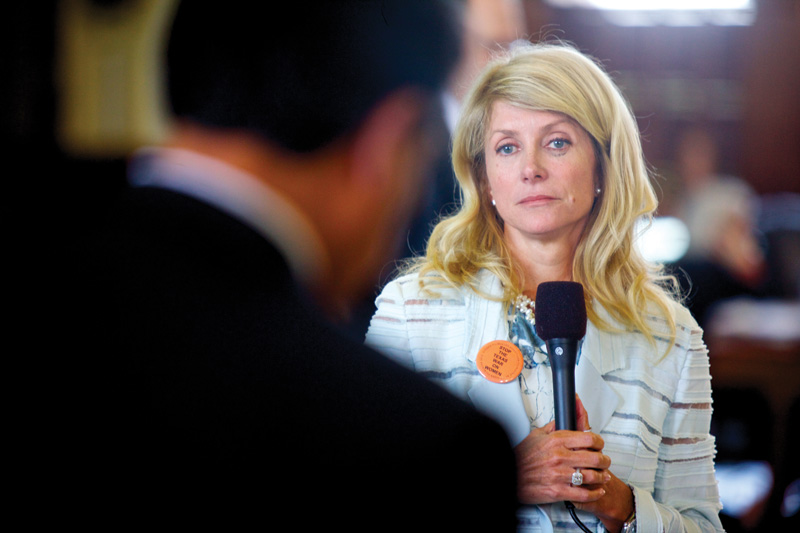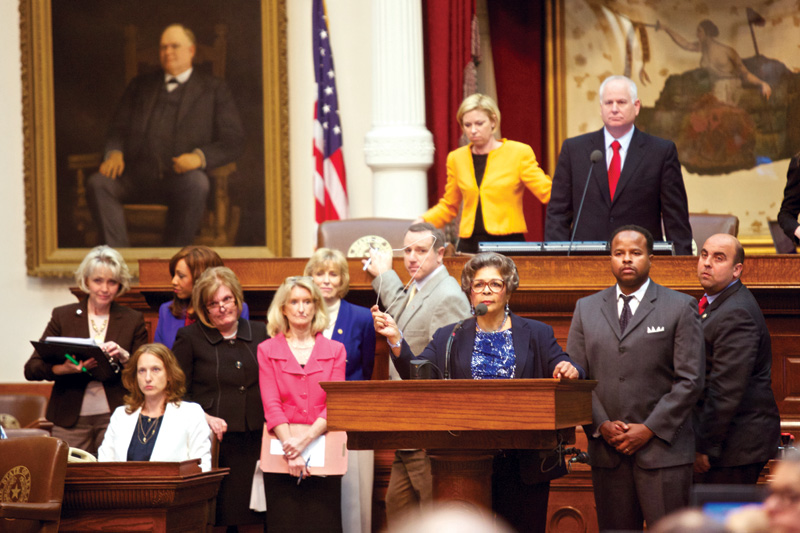
The Texas Legislature’s Sexist Little Secret
Tales from "the last of the good ol' boys clubs."
A version of this story ran in the August 2013 issue.
In January, I returned to my home state to cover the Texas Legislature. After a seven-year absence, I was eager to spend the next 140 days writing for this magazine about the theatrics—and occasional clownery—of the Legislature’s 2013 regular session. I had no idea what I was getting into.
It didn’t take me long to realize that as a woman, and especially a young woman, I’d be treated differently than my male colleagues. Within weeks, I’d already heard a few horrifying stories. Like the time a former Observer staffer, on her first day in the Capitol, was invited by a state senator back to his office for personal “tutoring.” Or, last session, when Rep. Mike “Tuffy” Hamilton interrupted Marisa Marquez during a House floor debate to ask if her breasts were real or fake.
Thankfully I never experienced anything so sexually explicit. Instead, I encountered a string of subtle but demeaning comments. One of the first interviews I conducted for the Observer, in February, was with a male senator about an anti-abortion bill. I was asking questions about whether the bill would reduce access to abortion. At the end of the interview, as soon as I turned off my recorder, he said, “How old are you, sweetheart? You look so young.”
Another day, near the end of the regular session, I was at the Capitol (doing interviews for this story, coincidentally) when a House page stopped me on my way out of the chamber. “I’ve never seen you in here before,” he said. “Who do you work for?” I answered the question, assuming that he wanted to see my press badge. “Well, uh, this may seem forward,” he stammered, “but I’m not sure if I’ll ever see you again—could I maybe take you out to lunch or dinner some time?” He looked about 16, red-faced and innocent. I politely declined. When I walked over to the Senate chamber, a staffer stopped me. “Wow,” he said. “You look really beautiful today.” My face turned red. I thanked him and walked to a seat at the press table. It was the third time that day the staffer had mentioned my appearance, and I was beginning to feel that what I looked like mattered more than my work—at least to the men in the building. At a certain point, after enough of these run-ins—which included male staffers from both chambers, some of whom I knew to be married, hitting on me, making comments about my physical appearance, touching my arm—it finally occurred to me that, when I was at work, I was often fending off advances like I was in a bar.
What surprised me was how many women who work in the Capitol—legislators, staffers, lobbyists, other reporters—felt the same way. Everyone, it seemed, had a story or anecdote about being objectified or patronized.

Even the most powerful women in the Legislature experience it. When I started interviewing women lawmakers, they all—Republican and Democrat, House and Senate, rural and urban—said that being a woman in the statehouse is more difficult than being a man. Some told of senators ogling women on the Senate floor or watching porn on iPads and on state-owned computers, of legislators hitting on female staffers or using them to help them meet women, and of hundreds of little comments in public and private that women had to brush off to go about their day. Some said they often felt marginalized and not listened to—that the sexism in the Legislature made their jobs harder and, at times, produced public policy hostile to women.
Yet, despite their strong feelings, women in the Capitol rarely talk about, except in the most private discussions, the misogyny they see all the time. It’s just the way the Legislature has always been.
In a state where women serve as mayors, sheriffs and CEOs, the Texas statehouse remains anachronistically male-dominated. Women comprise more than half of the state’s population, yet only about 20 percent of the Legislature—just 37 of the 181 members of both chambers. Women in leadership positions are even more scarce. There have been two female governors of Texas, zero female lieutenant governors and zero speakers of the House. That means neither chamber has ever been led by a woman.
That history makes what happened on June 25—when Sen. Wendy Davis filibustered a restrictive anti-abortion bill for 11 hours—so remarkable. When the mostly male GOP majority cut her off and tried to pass the bill minutes before a midnight deadline, Sen. Leticia Van de Putte had had enough: “At what point must a female senator raise her hand or her voice to be recognized over her male colleagues?” The largely female crowd in the gallery erupted and, over the next 15 minutes, shouted the Senate into paralysis. It was a rare moment when women seized control of the Capitol, and the first time I’d heard a woman lawmaker in this state publicly admit she felt sidelined.
But the moment was fleeting. Three weeks later, in a new special session, the Legislature passed the anti-abortion bill, and Gov. Rick Perry signed it. Texas politics, briefly upended, returned to normal.
Misogyny, as I had come to learn, is rampant in the Texas Capitol.
Or, as Houston Republican Joan Huffman put it, “It’s probably the last of the good ol’ boys clubs.”

Few lawmakers have served longer in the boys club than Senfronia Thompson. Affectionately known around the Capitol as “Miss T,” she is serving her 20th session. She has represented Houston in the Texas House for 40 years, the longest-serving woman state legislator in Texas history. In her legislative career, the 74-year-old civil rights leader passed Texas’ first alimony law, and fought and won support for legislation to protect gay men and lesbians from hate crimes. Thompson was first elected in 1973, less than a decade after Barbara Jordan (the first African-American woman elected to the Legislature), and she has passed more than 200 Texas laws. Other women in the House look to Miss T for guidance, and she is often willing to speak out when others are not.
Senfronia Thompson’s “Matter of Personal Privilege” speech.
“When I first got here in 1973, a guy called me his ‘black mistress,’” she told me. “The males could not understand why I was offended. He was a state representative. Let me tell you what happened: He didn’t come back, he was appointed a district court judge.” Thompson says that’s a common tale in the Capitol: a male legislator can say something sexist and experience little to no consequences, and, in some cases, be promoted.
Thompson said she’s seen attitudes toward women improve during her tenure as the number of women in the Legislature has increased. But it hasn’t changed that much, and Thompson says she isn’t satisfied. More women serve in powerful roles, but Thompson said looks can be deceiving. “Just because a woman holds a position of chairmanship doesn’t mean that she is in a leadership position necessarily,” she told me. “Women are not usually included in decision-making, even involving their own committees, even when it may look like it from the outside. … To this day, we are still marginalized,” she said.
There’s still plenty of overt sexism, too. Take what happened in 2011 to Thompson’s House Bill 2093, a measure about contractor insurance. “I had a feeling that someone was trying to kill this bill,” she said recently. “You know, after a while, you get a feel for what the movements are. And all of a sudden, I get passed this picture of a pacifier. They had my bill [number] on it and said that I was trying to make Texas a ‘Nanny State.’” The bill had nothing to do with motherhood or childcare.
The flier had been produced by the Texas Civil Justice League—a conservative legal reform organization opposed to the bill. Thompson decided to ignore it. But that afternoon, she encountered another nanny-state flier. Instead of a pacifier, this one had an image of a woman’s breast. Thompson was outraged.
It was the same session that saw the Legislature cut funding for women’s health care and family planning by two-thirds, and pass a bill requiring women to endure a pre-abortion sonogram. It was also the session in which Tuffy Hamilton, during a debate about Franklin Mountains State Park, made a boob joke to Marisa Marquez. (“Young lady, would you please tell us why your mountains are better than any of our mountains, and are they man-made or are they real mountains?”)
After she saw the breast flier, Thompson decided to speak up. “I just get tired of things being funny and of women being dogged out,” she told me. “That was unnecessary, there was no reason for it. There would’ve been nothing that initiated that kind of conduct. So I gave a speech.”
Thompson went to the front microphone on the House floor and addressed the chamber. For a rare few minutes, the Legislature’s dirty secret was discussed publicly, as Thompson spoke about the need to respect women in the House. At one point, she cried, and at another point, her bracelet broke under the force of her fist slamming the podium in anger. “They have no right to do women this way,” she told her colleagues. “We have not earned this disrespect in this House. We fight here, we get elected just like you do, and we have not earned this kind of disrespect. I don’t want to tolerate it by anybody. Men, if you don’t stand up for us today, don’t you walk in this chamber tomorrow.
“Lawmakers, as we are, have an opportunity to shape the attitudes of the public. And those attitudes can be positive toward women, they can be negative toward women, or they can be both. That falls within all of our abilities.”
While Thompson was still at the front mic, Debbie Riddle stepped to the back microphone to ask a question. Riddle, a socially conservative Republican from the Houston suburbs, and Thompson, a liberal Democrat from an urban district, don’t side with one another often. But on this day, they did.
“Do you think this has become standard operating procedure by some because of what goes on in this House with the way some of the men have treated some of the women?” Riddle asked. “With pornography on the floor of this House. Do you think that’s why this is acceptable?”
“We’re going to find out just what’s acceptable, and we’re going to see what they’re made out of—sugar and spice and everything nice,” Thompson said.
Her seven-minute speech became famous. At a party this summer, a former Lege staffer told me that she cried when she watched the speech online. It was the first time she’d ever heard anyone speak openly about the kind of sexism she encountered routinely during her time at the Capitol.
In the end, according to Van de Putte, the Civil Justice League fired the lobbyist responsible for those nanny fliers and issued an apology. But the culture in the Capitol didn’t change.
When I asked why other women don’t speak up about the atmosphere, Thompson cited political ambition. “Everybody who comes here, they’re looking at, ‘Can I go higher politically?’” she said. “To some degree, political office and winning is so important and imperative to us that we are willing to turn our heads and tolerate things that wouldn’t uphold the dignity of a woman. I’m not sure if we contribute to that. And it bothers me.”
She added, “I’m just not sure right now we have enough women who are willing to [speak up].”
Some women lawmakers not only tolerate misogyny at the Legislature, they play into it. In January, the Texas Public Policy Foundation, a conservative think tank, held a panel on the future of Texas electricity at its annual policy conference. The only woman on the panel, Rep. Patricia Harless, a Republican from Spring, began her speech with a blonde joke: “It’s always scary when they ask a blonde female to be on a panel with all these men that know so much about electricity.” Afterward, Katie Thompson, a conservative writer, tweeted from her account @TexasGrizzlette, “I’m not sure it’s appropriate for female legislators to make blonde jokes about themselves. Doesn’t exactly encourage credibility.”
On one of my first days covering the Texas Senate, Sen. Joan Huffman uttered a similarly self-effacing line. The senators were honoring Houston Democrat John Whitmire for his 40 years in the Legislature. In her speech, Huffman, a former prosecutor and state district judge, said, “I think it says a lot about you that you were willing to let me serve as your vice chair [on the Senate Committee on Criminal Justice], with my background and being a woman. But you took me in, and I’ve learned a lot from you.” Like Katie Thompson, I wondered why these women were denying themselves credibility.
I got a partial answer when I asked Huffman about her experience as a working woman in the criminal-justice system. She recalled that back in the 1980s, early in her tenure as a prosecutor in the Harris County district attorney’s office, she helped wage a campaign to convince her boss to allow women in the office to wear pantsuits instead of skirts. They decided they needed to display the kinds of clothes they wanted to wear—and that’s how accomplished women lawyers ended up putting on a fashion show for the men in their office.

It’s hard to imagine Sen. Judith Zaffirini putting on a fashion show at the office.
Many women in the House said they looked up to Senfronia Thompson, and several women in the Senate—including Wendy Davis—mentioned Zaffirini as a role model. The Laredo Democrat is known for her toughness and is rarely seen without at least one policy binder. She’s not to be trifled with. But even she isn’t immune to being demeaned.
In April, Zaffirini brought a proposal to the floor. The Senate was discussing an omnibus bill on the Texas Preservation Board, and she wanted to allow lactation suites in the Capitol, where women could breast feed or pump. Amarillo Republican Kel Seliger introduced a farcical amendment to make those lactation suites part of Zaffirini’s office. “It’s not funny. It’s not funny. It’s not funny,” Zaffirini muttered to herself.
“I think that a lot of people have a double standard and perhaps have higher expectations for women,” Zaffirini told me later in the session. “The role of women in the Legislature has changed over the years, and the biggest problem we have is that there aren’t enough of us.”
Austin Democratic Rep. Donna Howard was more blunt about the behavior of some male lawmakers. “Part of it seems to be acting like middle-school boys,” she said.
During the House budget debate in April, Brenham Republican Lois Kolkhorst and Austin Democrat Dawnna Dukes were debating an amendment. As the debate intensified, their male colleagues in the chamber started meowing and making angry-cat noises. Several times each session, men in the House will make cat noises when two women are debating.
“It shows how there’s this immediate visceral response from the men to treat us in a demeaning way,” Howard said. “Certainly, two men can go at it, and it’s thought to be business as usual, maybe because we expect that behavior from them. But the fact is that it’s still very hard for women to be assertive without being thought of as overly aggressive.”
When I asked Van de Putte if this immaturity is ever apparent on the Senate floor, she answered, “At times. You know, [pornographic images] on their personal iPads or something. You just say, ‘Gentlemen, don’t bring that to the floor… Just do that at home.’”
Howard also alluded to enthusiastic physical contact between House members. “You may have noticed that there’s a lot of hugging and friendship and that sort of thing going on,” she told me. “Sometimes people take that too far and feel like they can invade your space or touch you—and I’m not talking about an ‘inappropriate’ touch so much, but touching you more than you might want them to. We’ve kind of opened the door for that kind of relationship, and then they take advantage of it.”
Given the male domination of Texas politics, the events of June 25—the night women took over the Capitol—seem even more incredible.
On the fateful night when Wendy Davis, in her now-famous pink running shoes, filibustered the anti-abortion bill, sometime after midnight everyone was scrambling to piece together whether the bill had passed. A crowd of reporters formed around Davis on the Senate floor. Most reporters were asking how Davis felt (“tired”) or what she thought the political implications would be (“I’m not really thinking about that right now”). As I looked around at the older, male reporters, I couldn’t understand why no one was asking about the people Davis had done all of this for—women. So I asked.
“Women showed a lot of strength today,” Davis said. “They showed that they’re paying attention and that these issues mattered deeply to them. I think that women in Texas are tired of being on the receiving end of some pretty abusive power plays here in the Texas Capitol.”
Since she joined the Senate in 2009 after defeating Republican incumbent Kim Brimer—who The Washington Spectator once called a “cigar-chomping, silver-haired good-old-boy”— Davis hasn’t shied away from controversy. She’s been a vocal critic of cuts to education and family planning, and she’s attempted two filibusters in her three sessions. Despite her outspokenness—or perhaps because of it—she’s endured some especially condescending remarks.
Sen. Troy Fraser has trouble hearing “women’s voices.”
During a floor debate in Davis’ first session, Sen. Troy Fraser, a Republican from Horseshoe Bay, infamously told Davis that he couldn’t understand what she was saying because he “can’t hear women’s voices.” And during the Senate budget debate this session, Davis and Republican Finance Committee Chair Tommy Williams had a run-in of their own. Everyone was getting along swimmingly, going around the room thanking each other for their leadership and for Williams’ hard work on the budget. That is, until Davis raised an amendment and questioned whether the budget actually provided schools with adequate funding. Despite the fact that Davis was clearly informed on the subject, Williams’ tone shifted from respectful to condescending. “I’d be glad to sit down with you and show you why your numbers are wrong,” Williams said.
Weeks before her famous filibuster, I asked Davis about the sometimes sexist atmosphere in the Capitol. “It’s not OK,” she said. “Families treat each other with respect, and families that don’t are not families. I am able to disregard it; I’m able to let it roll off my back because there’s nothing to be gained in making an issue of it. But it certainly exists, and I think that the obligation that we have as women is to march forward regardless and to demand the respect that we deserve. That’s what I try to do.”
When I asked if she felt this way frequently, she said, “Sometimes, but I think that isn’t unique to the Legislature. You know, regardless of where we are as women and the profession that we’ve adopted, we face those challenges … I do think that women tend to, when faced with a confrontational situation, want to defer to pulling back, and that we do have to fight against our conciliatory natures and really lean in and push hard when we believe in something. And I can see that here, where the male legislators tend to be more confident about that: confrontation when it’s needed.”
She said that lawmakers most often disagree on ideological, not gender, lines. In 2011, when the family-planning budget was slashed by two-thirds, Davis contends, it was clear that “political ideology rose far above any pragmatic concern for the repercussions that decision was going to have on women’s lives.
“It’s disappointing,” she said. “There were Republican women who were as rabid about those cuts as our male counterparts were. I don’t think it’s gender directive, but it certainly has an overabundant consequence on women. ”
Despite ideological differences, though, many Republican women are bothered by how they’re treated at the Capitol.
“I’ve had many comments before. ‘Well, that’s just you girls.’ You know, not my favorite comment, but one that I’ve grown up and dealt with,” Lois Kolkhorst said. “This session has reminded me to look back and think about the real pioneers that we’ve had for women. Barbara Jordan—I can’t imagine being an African-American female and the things that she accomplished in breaking the glass ceiling. So, sometimes I’m challenged inwardly to see, ‘Have I broken any glass ceilings for the women behind me? Have I made this world a little bit better for my daughter to succeed?’ And I’m not always sure I can answer that ‘yes.’”
In our conversation, Kolkhorst recalled the observation another lawmaker made to her: “Serving in the Legislature is like being a scientist. You can stand back and watch a test tube of human struggles all on the House floor.
“I think that there have been times over my seven terms where women really flourished, and I think that we’ve retracted on that,” Kolkhorst said. “I think that I’m a little bit like Miss T. I’m not sure we’ve made great strides.”
In fact, Davis’ filibuster may have breathed new life into the Texas Democratic Party and reinvigorated pro-choice activists in Texas, but it hasn’t yet changed how women are treated at the Capitol. On July 12, three weeks after Davis’ filibuster, the Senate passed the anti-abortion bill. Before the debate, state troopers searched spectators entering the gallery. After hearing rumors that some planned to throw objects onto the chamber floor, officers confiscated personal items from spectators. Women entering the Senate gallery that day were forced to hand over their tampons and maxi pads.
If we’re waiting for the Legislature to prove it isn’t a hostile place for women, we may want to strap on some of those pink tennis shoes. We’ll be standing for a while.


